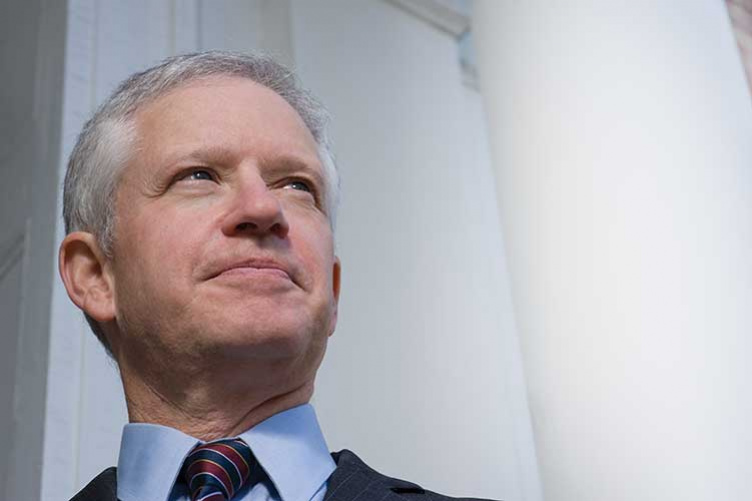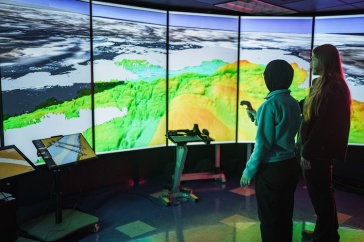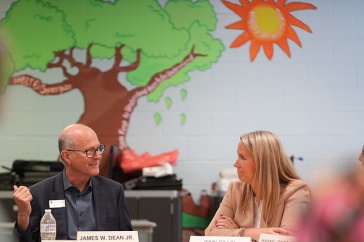
Photo: Valerie Lester
Michael Ettlinger was a newbie in the tax policy world when his boss turned to him one day and said: “Go do CNN for me.” Those were daunting words for someone who was still learning the ropes — but the pressure was really on when Ettlinger found out he would be debating the former chair of the Council of Economic Advisors. He was sure it was only a matter of time before the expert embarrassed him on live television. But just after Ettlinger delivered a particularly well-made point, the network cut away to cover breaking news about notorious mobster John Gotti.
“And it was perfect timing, because it saved me,” Ettlinger says. “I’m sure he would’ve crushed me in the debate because he knew so much more than I did. But I got in a good line, and boom, we’re going to this breaking news.”
He might have gotten lucky in that particular moment, but over the many years since then, Ettlinger, the founding director of UNH’s brand new Carsey School of Public Policy, has built his career on a lot more than chance opportunities. He graduated from Cornell University in 1981 with a degree in electrical engineering, but found himself drawn to public policy and by 1984 was in Washington, D.C., earning a law degree from American University. After that it was a stint with the New York State legislature and then a rise through Washington-based think tanks working first in tax policy, then moving to a broader range of budget and economic issues. “One of the things I most enjoy about working on economic issues, and budget issues, is that it connects me with such an array of subjects,” says Ettlinger. “From health care to the environment to international relations and immigration — the economic, tax and budget implications are critical, so even though I’m not a health care expert or a foreign policy expert, I’ve gotten to work on those, and many other, issues.”
And while the pace of life at UNH might be slower than his jobs in Washington, the most recent as senior director for fiscal and economic policy with The Pew Charitable Trusts, he sees the move as the next great opportunity: the chance to educate a new generation of effective policy makers with the real-world skills to make a difference across a broad range of disciplines.
The Carsey School, established in 2014, is the result of two generous gifts from Emmy award-winning television producer Marcy Peterson Carsey ’66. In May 2002, Carsey gave $7.5 million to establish the Carsey Institute, a place that former Carsey Institute director Cynthia “Mil” Duncan says “would pay attention to vulnerable families and communities.” In 2013, Carsey gave her alma mater an additional $20 million — the second largest gift UNH has ever received — to expand the institute into a full public policy school.
Carsey School senior fellow and academic planning committee co-chair Sally Ward says that Marcy Carsey, who credits much of her own success to her working-class background, wanted to make sure her gifts would have an impact on society. “And that just seemed a perfect fit for what the faculty had been talking about with regard to a school of public policy,” Ward says, “because public policy is about making an impact and helping generate informed, evidence-based decisions for the betterment of society.”
At first blush, it may seem like the most esoteric of subjects, but Ettlinger says public policy is a way for people to come together and attempt not only to solve problems, but to make improvements. And he believes there are many areas where policy is critical: environmental issues, social issues, poverty, the economy, jobs, health. “The mission of ‘public policy’ isn’t just about the mechanics of government budgets, paved streets and public education,” he explains. “It’s about the value of making society stronger and people’s lives better.”
Ward puts an even finer point on it. “We have very significant, pressing problems in society,” she says. “And one of the ways of dealing with those problems is to develop policy to address them. With the increasingly complex world, the problems only get more complicated and more in need of good, solid policy research to inform the decisions that are made about them.”

Building on a national reputation
Since 2004, the stock-in-trade of the Carsey Institute has been its research — Carsey researchers have produced some 230 original applied research briefs and reports on everything from Hispanic birth rates to rural poverty trends, to climate change and land use trends, which in turn have formed the basis of thousands of stories in the popular media. Now, Ettlinger says, that research will continue to be central to the new Carsey School’s mission.
“I think there’s a lot of our work, particularly around poverty and demographic issues, that politicians in Washington and in state government are using to better understand the latest data and trends happening across the country,” he says. “We find our research being used in legislative activities, in community planning and in grants to help contextualize the effects of various policies and demographic trends.”
A case in point: In 2012 and 2015, Carsey researchers studied the Community Development Finance Industry for the U.S. Department of Treasury and recommended ways the Treasury could improve the industry. This past spring, they suggested that the Treasury “establish a fund to promote networking innovations that could build scale in the field.” The Treasury listened and started one.
Indeed, it’s Ettlinger’s hope that the school will emphasize budget issues, an aspect of policy he focused on in Washington. “The federal budget is 20 percent of the U.S. economy,” he says. “And when you talk about policy, not everything’s about money, but a lot of it is. And so it’s really hard to have policy discussions without understanding the dollars and cents of this and how the federal budget works and the implications of that. And I want us to really build our capacity in that space.”
The work being done on population analysis is equally important. Senior demographer Kenneth Johnson’s research is a perfect example; according to Ward, his findings have been crucial to understanding not just the demographics of New Hampshire, but of rural America in general. “It’s cited by the press; it’s cited by other scholars; it’s cited by policy makers,” Ward says. “Because really to understand what the state needs, we have to understand the nature of the population. So one thing that’s been clear about the changing demographics in New Hampshire is the population is aging and that has lots of implications for future policy.”

Why public policy matters
The trajectory of a public policy education has changed over the years. Carsey faculty member Stacy VanDeveer, a political science professor and co-chair of the academic planning committee, says that 20 years ago, the logical assumption for any policy school graduate would be a government job. Nowadays, though, there are many other opportunities.
“Public policy is about making an impact and helping generate informed, evidence-based decisions for the betterment of society.”
— Sally Ward Carsey
School Senior Fellow and Professor
of Sociology
Today, VanDeveer says, graduates will typically build an area of expertise over time, such as food policy or health care policy but they’ll work for a range of organizations and often spend time in both the public and private sectors. “What we want to do is equip them with the kind of analytical skills and the strategic skills to move seamlessly through different kinds of organizations to advance their own careers and problem-solving,” he says.
This past June, Scandinavian furniture giant Ikea pledged $1.13 billion for clean energy projects, with an eye toward running all of its stores using only renewable energy sources while also helping poor communities “build resilience to climate change” with renewable energy technologies. Those students who are interested in public policies around renewable energy could end up working for Ikea just as easily as they could end up in Washington.
It’s easy to romanticize the idea of a life devoted to society’s issues, but Ettlinger emphasizes that public policy isn’t like something you see in the movies. “It’s not like there’s this moment where there’s this brilliant idea of how to win a fight or how to change the world, and then there’s a quick vote in Congress and you all walk out winners,” he says. “Those moments are very few and far between. The big wins are typically long- and hard- fought. And much of how change happens is with lots of small victories and defeats that end up adding up to something.”
“There’s a lot of our work, particularly around poverty and demographic issues, that politicians in Washington and in state government are using to better understand the latest data and trends happening across the country,” he says. “We find our research being used in legislative activities, in community planning and in grants to help contextualize the effects of various policies and demographic trends.”
— Michael Ettlinger
founding director, Carsey School of
Public Policy
Those victories, however, can have long-term effects that benefit individuals, a point VanDeveer illustrates using the example of energy efficiency standards policy. “We can take a policy like energy efficiency standards, and we can demonstrate that yes, it addresses an environmental issue, but it also addresses affordability of heating in New England; it also addresses people’s pocketbooks every day over time,” he says. Those, he says, are exactly the kinds of policies everyone wants: ones that have the type of win/win/win outcomes that are good for consumers, good for homeowners and renters, and are also environmentally responsible for now and the future.
At the most basic level, public policy is about helping individuals and communities make informed decisions, and in an age where an issue or a law can be influenced by a quick tweet, Ettlinger says, it’s more important than ever to understand all sides of an argument. “That’s one of the reasons why — especially in the upcoming presidential election — a place like the Carsey School, which relies on facts and research, is an enormous resource for the media,” he explains. “Politicians abuse evidence all the time. And once the debate just gets off into everyone asserting conflicting ‘facts,’ democracy doesn’t work very well, because the public is not making an informed decision.”
Rigorous and evidence-based research that comes out of public policy schools can help steer a productive national conversation. “One of the things we really want to teach in this school is that there are many issues where reasonable minds can differ, and you need to respect that,” Ettlinger says. “It’s important in good policymaking to remember that, because it’s easy to look down on your opposition, to think that they’re either Neanderthals or just don’t get it, and you need to open your mind to the fact that the other side maybe has some good points too.” That kind of measured thinking takes time — and it’s something that an academic environment specializes in.
The public policy leaders of the future
In October, the Carsey School launched a new degree program — a master in public policy (MPP) that expects to welcome an inaugural class of 15-25 students next fall. The new program, which will complement an existing master of arts in community development policy and practice degree, will include coursework in the fundamentals of policy analysis, statistics for policy-making, economics for policy and comparative public policy, in which students will look for solutions to domestic problems on an international level. They’ll be able to specialize in a specific area — international policy or environmental issues — and importantly, there will be experiential components to the program, including an internship and a J-term colloquium in Washington, D.C., “to see policymaking up close and personal,” Ward says.
Master in Public Policy (MPP) at the Carsey School of Public Policy
Overview: Students in the Carsey MPP program are required to complete 40 credits including five core courses, a Washington, D.C., colloquium during the January term, an internship experience and a capstone project. These provide the foundational analytical, strategic and communication skills for a successful career in the world of policy making. Students develop further depth in either a policy analysis or a strategy and communication track, completing two additional elective courses in one of the tracks. Courses in both tracks can also be taken as open electives. Further opportunities for depth and specialization in substantive policy areas are provided by open elective courses, which vary each semester. The program provides flexibility to students to fulfill the degree requirements. Students can earn the Carsey MPP degree in as little as 14–16 months. Additional graduate certificates at UNH can be partially applied toward the MPP.
Application deadline: UNH seniors for accelerated masters: January 1. Applicants requesting financial assistance and UNH juniors: February 15. Rolling admission until July 1 for applicants not requesting financial assistance.
Website: carsey.unh.edu/mpp/
For Ettlinger, the real-world aspect of the new program is essential. When he worked in D.C., he says, he hired or worked with a lot of people who had public policy degrees, but they didn’t necessarily graduate ready to hit the ground running in the policy world that he inhabited. While the programs they came from did a good job of providing training on the analytics side — looking at public policy and figuring out whether programs are working or not; to some extent designing solutions to policy challenges — they didn’t emphasize the strategic and communication skills Ettlinger thinks are imperative, and are among the many reasons he is so excited about his job at UNH. The Carsey MPP degree will emphasize analysis as well as how to actually make change happen by communicating effectively and understanding how to design, implement and evaluate good policies.
The Carsey School will draw on experts from across the university, including those who focus on environmental issues, women’s issues and international relations, among other diverse subjects. But Ettlinger says the school will also rely on outside practitioners who have hands-on experience, including experts he knows from Washington who can visit campus and teach remotely.
Ettlinger can’t imagine a more perfect place than New Hampshire for this new venture. For one thing, he says, there’s New Hampshire’s proximity to Massachusetts — a state with an interventionist government that’s in sharp contrast with its own minimalist approach. “That makes for a perfect test bed in which to evaluate the impact of policy across different environments,” he says. But it also has to do with the spirit of New Hampshire itself, from its state-motto “Live Free or Die” ethos to the fierce pride it takes in its nation-leading political primary. “New Hampshire emphasizes, above all else, an engagement with intellectual debate,” Ettlinger says. The Carsey School stands at a critical juncture, helping to shape not just current policy but programs and solutions that will help set the course for the future.
For more information, visit carsey.unh.edu.
Originally published in UNH Magazine—Fall 2015 Issue
-
Written By:
Michele Filgate '06 | Freelance Writer



















































